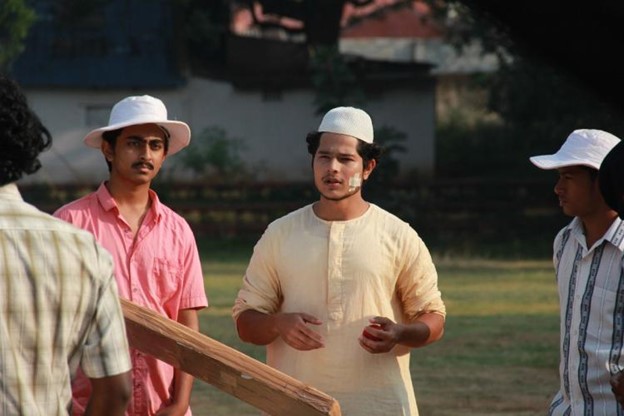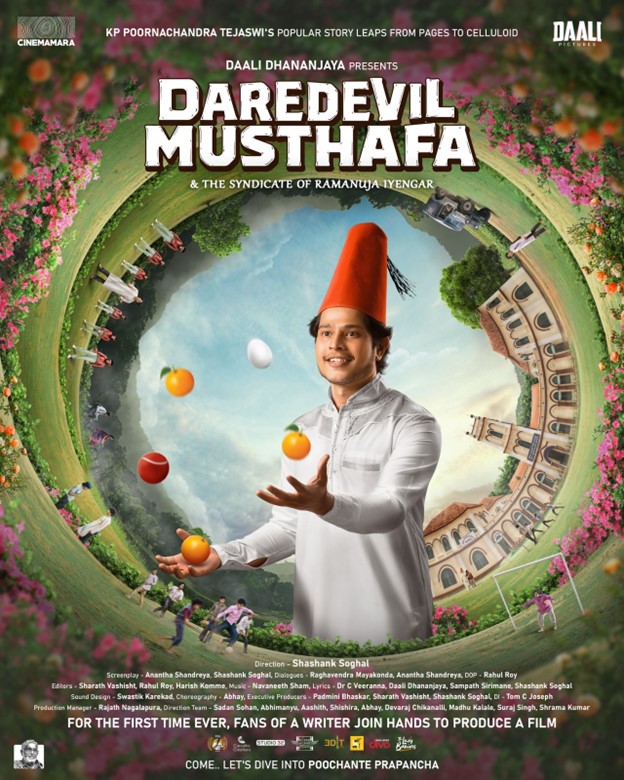Daredevil Musthafa (2023)
Director: Shashank Soghal
Reviewer: Sadat Hussain
Daredevil Musthafa (2023) is a unique film for various reasons. This film is unique because it was produced by more than 100 fans of KP Poornachandra Tejaswi after the debutante director was turned down by over 100 producers.
Tejaswi is a prolific Kannada writer, novelist, photographer, and environmentalist. His short stories and other literary works have been included in the Kannada textbooks. The film is striking because of its storyline, which every Kannadiga who has studied in a Government/Aided Pre-University Colleges in Karnataka can identify with. These colleges are highly diverse educational spaces where students from every gender, religion, caste, creed, and colour come together to pursue senior secondary-level education.

The film is an adaptation of the short story ‘Daredevil Musthafa’ from the book ‘Abachoorina Post Office’ (Post Office of Abachoor) written by Tejaswi in 1973. The film has mostly been shot at the historic, colonial-era Hardwick High School and College, Mysuru.
This film shows the everyday stereotypes about Muslims in a diverse society like India and how Musthafa responds to everything he faces. Musthafa comes across all possible types of stereotypes that a Muslim student at such colleges could face. In a darkly comedic sequence, the film shows how the students are alarmed even hearing his weighty name – Jamal Abdul Musthafa Hussain – and start to imagine all sorts of things about him, filling in the gaps with their own stereotypes.
The film subtly highlights the importance of the early socialization structures such as family, religion and caste, which play vital roles in the life of a human being. School is the latter stage of socialization where a child can learn and unlearn. Until the completion of schooling, if a child cannot understand society and its diversity well then, it is very possible that bigotry will shape his or her psyche.
The film shows that after facing each type of stereotype Musthafa processes them and engages with the world around him with empathy and grace knowing that his classmates, principal, teachers and non-teaching staff, parents of fellow classmates have internalized the misconceptions about Muslims because in his absence of any meaningful interaction between the communities.
One simple example is a scene where one of his classmates who happened to be a foodie enters the classroom during PT hour in search of good food in the tiffin boxes of the classmates. After not finding anything interesting food, the character opens the tiffin box of Jamal (Shishir Baikady) assuming he may find non-vegetarian food, but ends up getting curd-rice. Seeing his surprise, Musthafa explains that Muslims don’t eat biryani every day, but also eat everyday things like lentils.
Apart from intelligently revealing such stereotypes, the film also shows how such stereotypes can actively foster suspicion and discrimination against a common Muslim student who is forced to bear the burden of harmony in the village which has had a history of being communally sensitive due to past incidents that happened even before he had ever set foot there.
With an exciting climax in the form of a cricket match, a subtle musical background score with lyrics that highlight the need for societal harmony and mutual co-existence, and a talented young cast, Daredevil Musthafa is a must watch, particularly in the times we live in, where the medium of cinema has often been deployed to peddle hate than sending any positive social message. The film is available on Amazon Prime and has English subtitles.




